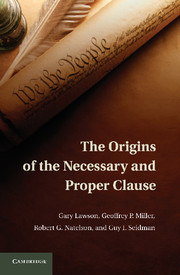Book contents
- Frontmatter
- Contents
- Acknowledgments
- 1 Raiders of the Lost Clause
- 2 Discretionary Grants in Eighteenth-Century English Legislation
- 3 An Ocean Away
- 4 The Legal Origins of the Necessary and Proper Clause
- 5 The Framing and Adoption of the Necessary and Proper Clause
- 6 Necessity, Propriety, and Reasonableness
- 7 The Corporate Law Background of the Necessary and Proper Clause
- Index
- References
3 - An Ocean Away
Eighteenth-Century Drafting in England and America
Published online by Cambridge University Press: 03 May 2011
- Frontmatter
- Contents
- Acknowledgments
- 1 Raiders of the Lost Clause
- 2 Discretionary Grants in Eighteenth-Century English Legislation
- 3 An Ocean Away
- 4 The Legal Origins of the Necessary and Proper Clause
- 5 The Framing and Adoption of the Necessary and Proper Clause
- 6 Necessity, Propriety, and Reasonableness
- 7 The Corporate Law Background of the Necessary and Proper Clause
- Index
- References
Summary
In 1795, after spending twelve years as a barrister, Charles Abbott (1757–1829) was elected to the House of Commons. He quickly became the leading figure urging the systematization and promulgation of the burgeoning mass of British statutes in the late eighteenth and early nineteenth centuries; indeed, one modern scholar calls him “the hero of statute promulgation.” In 1796, at Abbott's instigation, the House of Commons appointed a committee to study the many expiring and temporary statutes that had accumulated over the years. The committee's report, building on material gathered by Abbott, roundly decried the volume of, lack of systematization concerning, and publication practices respecting these statutes. More pointedly for our purposes, the report described the drafting style that was characteristic of these laws as “for the most part verbose, tautologous, and obscure; all of which circumstances seem to have engaged the attention of Parliament at successive periods, but not to have produced any improvement, in the degree which their importance demands.”
The committee's study was limited to expired or expiring laws, but it seems quite clear that the drafting defects identified by the report were characteristic of a broad pattern in eighteenth-century English statutory design. Indeed, critics who were not commissioned by the House of Commons were even less charitable about England's legislative work product than was Abbott and the committee that he inspired. Contemporary observers of eighteenth-century parliamentary drafting practices decried “the poor formulation, careless drafting, glaring inaccuracies and disturbing inconsistencies to be found in the statute book.”
- Type
- Chapter
- Information
- The Origins of the Necessary and Proper Clause , pp. 35 - 51Publisher: Cambridge University PressPrint publication year: 2010

